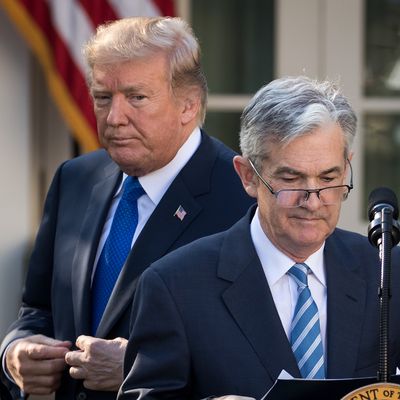
Donald Trump hates trade deficits. He thinks countries that buy more than they sell are losers and those that sell more than they buy are winners.
At first blush, this idea seems stupid: China sends us goods, we send China little slips of paper in response, and we’re supposed to be the losers? On further consideration, the idea is … well, it’s still not quite correct, but maybe it’s a little less stupid than it seems. After all, persistent trade deficits can cause problems — this is what Ben Bernanke was talking about a few years ago when he warned about a “global savings glut” that had pushed the U.S. into unemployment-fueling trade deficits. But that’s situational. Sometimes trade deficits are bad; sometimes they’re desirable. It depends. Unemployment doesn’t appear to be elevated right now, so this doesn’t feel like the situation where we should be freaking out about how trade deficits are holding back the U.S. economy.
But for the president, trade-deficit analysis is not situational. Even though the economy is good (and he loves to talk about the economy being good), he still thinks trade deficits are bad. Unfortunately for him, some of the tools he hopes to use to fight them aren’t going to work.
Consider the trade war with China. Because the trade war is bad for the Chinese economy, Trump’s tariff announcements tend to cause China’s currency, the yuan, to weaken against the dollar. A weaker yuan (and, by implication, a stronger dollar) means Chinese products become cheaper for American buyers and American exports become more expensive for Chinese buyers. In addition to the currency effect, worse growth prospects also make Chinese consumers less inclined to consume either American exports or their own domestically produced goods — which tends to mean more Chinese goods will be available on the export market. It doesn’t help that Trump is pressuring China at a time when its economy is already softening for other reasons.
Nonetheless, Trump is demanding the Chinese target the trade deficit by agreeing to buy more American goods in aggregate. This isn’t normally how it works; normally, trade deficits arise based on the consumption actions of individual consumers and businesses, who buy imported cars and televisions or not as they see fit. But China is not a fully free-market economy, so I guess asking China to do this is less ridiculous than if we asked, say, France. There are a lot of state-controlled companies that the Chinese government can direct to buy more American soybeans and such. Unfortunately, it’s not clear that either Chinese importers or American exporters have the capacity to increase American exports to China as aggressively as the Trump administration would like, especially if Chinese buying capacity is further hampered by both weaker growth and a weaker currency.
If Trump wants to shrink the global trade deficit, what he should really want is a weaker dollar, which would make American exports cheaper for our trading partners and imports more expensive for American consumers. He could take a page from his favorite world leader, Angela Merkel: Germany has essentially followed a weak-currency policy over the past decade by lashing its economically weaker neighbors into a shared, low-inflation currency, leading to a German trade surplus and low employment. (Unfortunately, this policy also caused German wage growth to stagnate and exacerbated political and economic crises in southern Europe; but then, everything in public policy is trade-offs.)
The president seems to understand this; unlike most politicians, especially most Republican politicians, he’s been able to bring himself to say out loud that a strong dollar can be a bad thing. And he keeps urging the Federal Reserve to ease policy by cutting short-term interest rates and restarting its quantitative-easing activities to push down long-term-interest rates. Among other effects, such moves would tend to cause the dollar to weaken. And Trump tried to appoint some people to the Federal Reserve Board who would listen to his demands, but he failed to interest the Republican-controlled Senate in confirming them.
We have generally talked about Trump wanting political control over the Federal Reserve so he could get a short-term boost to the domestic economy, as low rates encourage businesses and individuals to borrow and invest. (I’ve also noted that Trump has sometimes been right on the merits, especially when he has made more modest asks, such as that the Fed should stop raising rates, which it did.) But another reason for Trump to have wanted a compliant Fed is to help implement his trade policy. His failure to get that control is a major threat to his very public goal of cutting the trade deficit, regardless of what he manages to talk China into in coming rounds of talks.





























